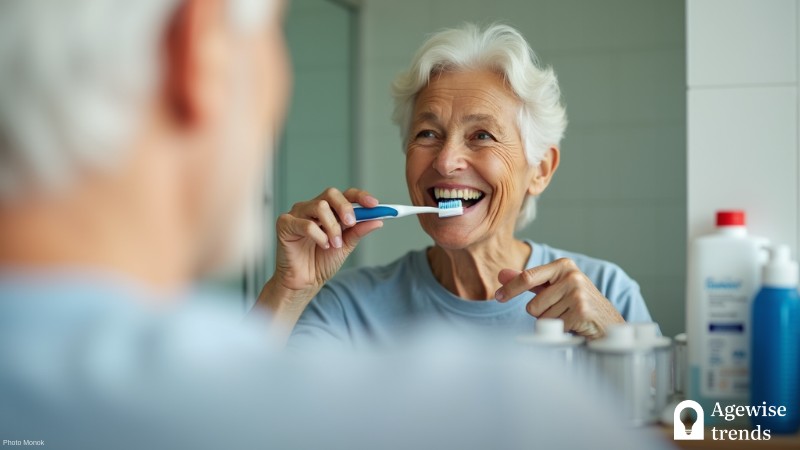Oral health remains essential at every stage of life, yet it requires extra attention in later years. Shifts in gum sensitivity, enamel strength, and saliva production can make teeth more vulnerable to decay and other issues.
Medications and health conditions often add to the challenge, increasing the risk of gum disease and tooth loss.
However, with the right care and preventive habits, older adults can keep their smiles strong, ensuring comfort, confidence, and overall well-being for years to come.
Key Takeaways
Maintaining strong teeth and gums in older adults is crucial for comfort, confidence, and overall well-being.
- Regular dental check-ups and cleanings are essential to prevent serious oral health issues.
- Proper daily hygiene practices, including the use of electric toothbrushes and flossing, help keep teeth and gums strong.
- A balanced diet rich in calcium and vitamins supports dental health and reduces the risk of cavities.
Maintaining dental health for older adults
Adopting the right strategies can help maintain oral wellness and prevent common problems. Simple daily practices play a key role in keeping teeth and gums strong over time.
The importance of regular dental check-ups
Regular dental check-ups and cleanings become even more critical with age. These visits help detect issues like cavities and gum disease early and prevent more serious complications.
Dental professionals recommend that older individuals schedule appointments at least twice a year for comprehensive examinations and cleanings.
Emphasizing proper oral hygiene routines
Brushing with fluoride toothpaste twice a day is vital in reducing the risk of dental issues.
However, aging can bring challenges like arthritis or reduced dexterity, making it harder to maintain oral hygiene. In such cases, specialized tools can help. Electric toothbrushes provide a gentler, more efficient cleaning experience than manual brushes, making them especially useful for older individuals.
Additionally, daily flossing is essential for removing plaque from areas that brushing alone cannot reach.
Monitoring changes in dental health
Older individuals should stay mindful of changes in their oral well-being, including increased sensitivity, bleeding gums, or discomfort while eating. These symptoms may indicate underlying conditions that require prompt attention.
Detecting and addressing dental issues early can lead to significantly better outcomes, especially when it comes to periodontal disease, which commonly affects those in their later years.
Addressing nutritional needs
Proper nutrition is essential for maintaining strong teeth and healthy gums, especially later in life. A well-balanced diet rich in essential vitamins and minerals helps strengthen tooth enamel and lower the risk of cavities.
Calcium-rich foods, such as dairy products and leafy greens, support dental health, while fruits and vegetables promote saliva production, aiding in the removal of harmful bacteria and acids from the mouth.
Considering dental implants as an option
For older adults missing one or more teeth, dental implants provide a durable, long-term solution that restores both function and appearance.
Unlike dentures, which often require adjustments over time, implants fuse with the jawbone, offering stability comparable to natural teeth.
While the initial cost may be higher, implants can be more cost-effective over time by reducing the need for frequent repairs or replacements associated with traditional dentures.
Choosing dental implants can significantly improve comfort while eating and speaking, considerably enhancing overall quality of life.
Staying informed about dental health
Staying informed about the latest insights and recommendations for oral health care is crucial, especially for older adults who may face unique dental challenges as they age.
Relying on trusted sources like the American Dental Association (ADA) or seeking advice from reputable dental professionals ensures access to accurate, personalized guidance tailored to specific oral health needs.
Conclusion
Staying proactive in discussions with a dental care provider about any concerns and closely following their guidance helps individuals maintain optimal oral health throughout their later years.
Consistently applying these recommendations enables seniors to preserve their dental wellness, significantly lowering the likelihood of developing serious oral health problems that could have broader effects on their overall well-being.














